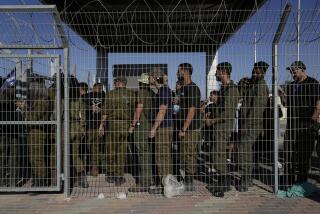Terror Suspect’s Injuries May Void Confession
- Share via
WASHINGTON — FBI agents have obtained a detailed confession from an accused Lebanese terrorist arrested Sept. 13 in the Mediterranean but Justice Department officials are concerned about its admissibility in court because of injuries the suspect suffered, apparently while in custody, government sources said Wednesday.
The FBI’s chief investigator, Oliver B. (Buck) Revell, said in an interview that he is seeking to “scotch” any suggestion that agents used “Gestapo tactics” in questioning Fawaz Younis.
Abuse Denied
“This is too important,” said Revell, the FBI’s executive assistant director for investigations, in insisting that no abuse occurred during the interrogation last week of Younis, the first Middle East terrorist suspect arrested abroad and returned to the United States.
Revell said he reviewed a videotape of Younis’ arrest in a sting operation aboard an FBI-rented yacht and determined that agents had followed “humane” law enforcement procedures.
Nonetheless, one Justice Department source said, Younis’ injuries “go to the question of voluntariness”--a reference to the fact that incriminating statements cannot be used in court unless they are freely given and not the result of coercion.
And Francis D. Carter, Younis’ court-appointed lawyer, said he plans to challenge the admissibility of Younis’ statements to the FBI because of his injuries.
“There are other problems (with the case) too,” said another government source, declining to elaborate.
Younis’ injuries--hairline fractures of both wrists--first came to public attention Tuesday when he appeared at a federal bond hearing with casts covering both forearms. The injuries were not discussed at the hearing, where he was ordered held for trial without bond.
Revell said that, if the fractures occurred while Younis was in FBI custody, they may have resulted from the pressure of the handcuffs on his wrists as he was being transferred at sea from one vessel to another.
“He didn’t resist arrest,” Revell said. “There was no fuss or struggle put up.”
Younis, suspected of the 1985 hijacking of a Jordanian airliner on which four Americans were passengers, allegedly was lured by the FBI onto the rented yacht in international waters with the promise of a large supply of drugs. After his arrest, he was transferred to a Navy utility vessel and later was flown from a U.S. aircraft carrier to Washington.
Revell would not confirm that Younis confessed during the questioning to hijacking the Jordanian jetliner. However, although stating that the issue of a statement’s admissibility in court is for a judge to decide, the veteran FBI official said: “If this statement is not admissible, then no statement is admissible.”
Revell said the Lebanese suspect also was interrogated over a three-day period about any information he might have about American hostages in Lebanon and about any imminent terrorist threats. Revell would not say whether Younis provided any hostage or terrorist information.
Carter said he plans to challenge the admissibility of Younis’ statements because of his injuries and because he had complained of seasickness, which could have influenced his cooperation.
Carter said in an interview that the wrist injuries clearly occurred while his client was aboard the FBI-rented yacht during his first several hours in custody. He said Younis complained about pain in his wrists as he was taken aboard the utility vessel. But full medical treatment, including X-rays, was not provided until his arrival in the Washington area, Carter said.
‘Nothing Has Been Provided’
He declined comment on whether Younis had confessed. “They talked to him about several things,” he said. “I have asked the government for a copy of whatever notes were taken during the interrogation but nothing has been provided to me.”
Revell said Younis could have injured himself before he was arrested. There was “a possibility--he was in Cyprus for three days on his own, partying and carrying on, that he could have hurt himself there. We just don’t know how it happened. It certainly didn’t happen in any fracas or confrontation or fight and he was certainly not abused or mistreated in any way,” he said.
Revell said he decided to break with normal FBI practice of not commenting on matters pending in court because “I wanted to scotch this thing real quick. This is too important. One of the things we’re talking about is fighting terrorism and you do it with the law. . . . We don’t want this to be conveyed as some sort of Gestapo, strong-arm tactics and (as if) we’re going out and beating these people. That could cause retaliation.
“This man was treated with absolute humanity. . . . “ Revell said, “and in fact, he cooperated with us. We were very interested in his cooperation. We wanted to know what he knew about the hostages and a lot of other things. So it certainly makes no sense we would abuse him, and he was not abused.”
Although the arrest aboard the yacht was videotaped, the subsequent interrogation sessions were not, Revell said. The questioning was conducted by a Palestinian-born FBI agent fluent in Arabic, and photographs were taken periodically, he said.
Revell confirmed that Younis had complained of wrist pain and nausea after his arrest. At one point, he said, an agent-interpreter loosened one of the handcuffs, and later a doctor examined him and concluded that the injury was probably a sprain.
More to Read
Sign up for Essential California
The most important California stories and recommendations in your inbox every morning.
You may occasionally receive promotional content from the Los Angeles Times.













